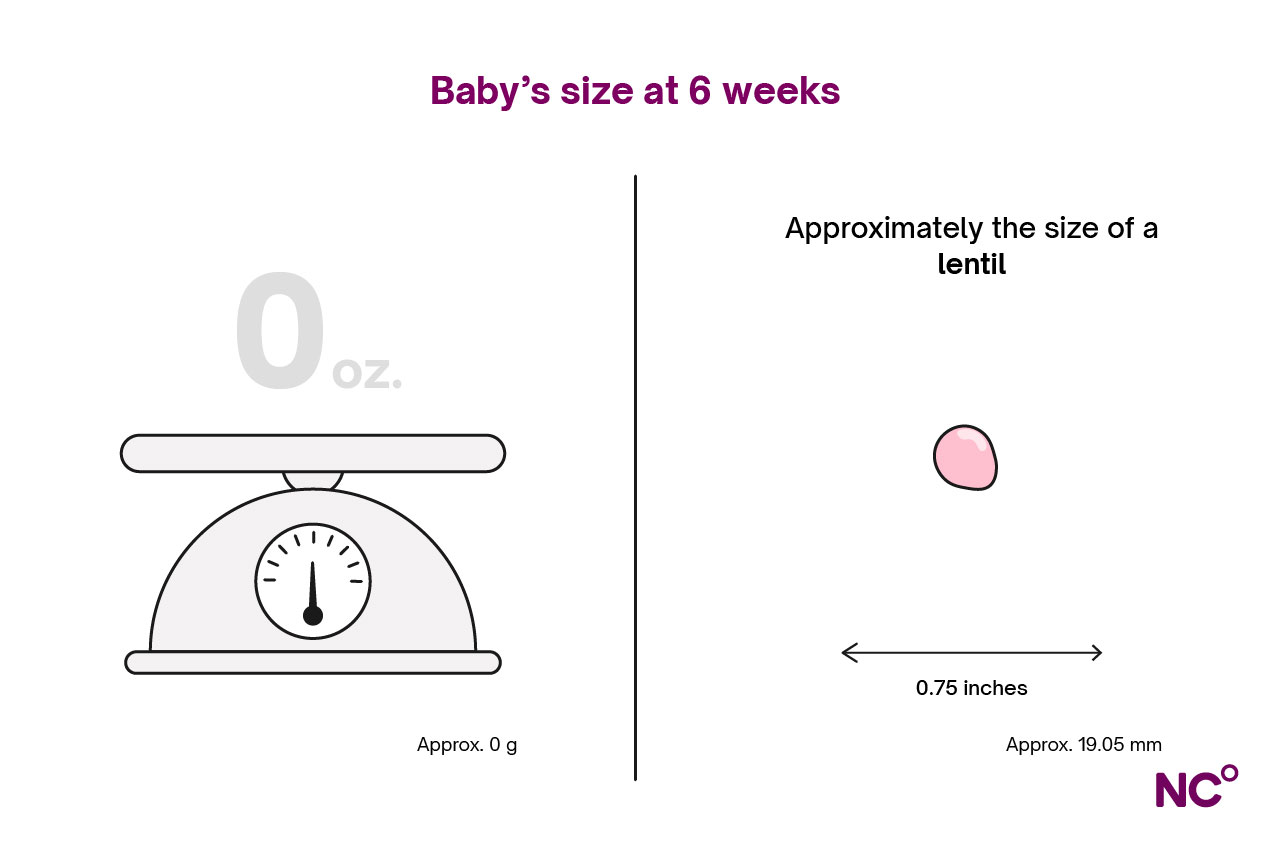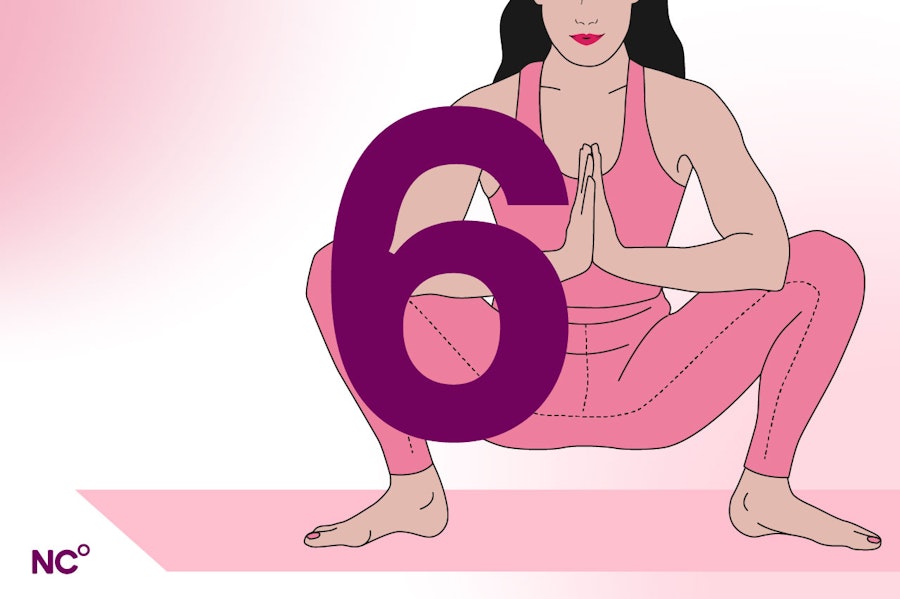6 Weeks pregnant: Symptoms, ultrasound, & what to expect
Follows NC° Editorial Policy
At Natural Cycles, our mission is to empower you with the knowledge you need to take charge of your health. At Cycle Matters, we create fact-checked, expert-written content that tackles these topics in a compassionate and accessible way. Read more...
Key takeaways:
- At this stage, early pregnancy symptoms like nausea and fatigue may announce themselves — focus on rest, hydration, and gentle nutrition to help manage symptoms
- Your baby is developing rapidly this week, with early signs of arms, legs, and even facial features beginning to form
- Now is a great time to prepare for your first prenatal visit by tracking your symptoms and writing down any questions you have
- Keep taking your prenatal vitamins daily — nutrients like folic acid are especially important right now to support your baby’s early development
At 6 weeks pregnant, things are starting to feel real. Emotionally, you may be feeling a mix of wonder, excitement, and uncertainty — and physically, your body is kicking into high gear to support the tiny life growing within you.
At this stage, you may be riding the first waves of morning sickness or fatigue. It’s also possible you’re not feeling any symptoms yet. Either way, week 6 marks a powerful moment in your journey: your baby’s heart begins to beat. This tiny flicker is one of the earliest signs of new life, and a reminder of the incredible changes happening behind the scenes. Remember to be gentle with yourself this week. This is a time of rapid development, and your body is doing exactly what it needs to do.
Pregnancy symptoms at week 6
At 6 weeks pregnant, your body is undergoing major changes to support your growing baby. Hormones like hCG (human chorionic gonadotropin) and progesterone are in full swing, triggering many of the physical and emotional changes you may be noticing [1].
Morning sickness: Feeling queasy or sick to your stomach? You’re not alone— about 80% of pregnant people experience nausea and vomiting in early pregnancy. Morning sickness is a hallmark symptom of early pregnancy, though the name is misleading: at 6 weeks pregnant (or any time during your first trimester), you may be feeling sick at any time of day, not just in the morning.
Note: If your symptoms become more severe and you can’t keep fluids down, check in with your doctor. It could be a sign of hyperemesis gravidarum (HG), a more serious condition that may need treatment [2, 3, 4, 5].
Frequent urge to pee: At 6 weeks pregnant, you may notice you’re making more bathroom trips than usual. This common (albeit inconvenient) symptom is a result of your body producing extra blood to support your baby. This means your kidneys, which are responsible for filtering blood and producing waste through urine, are working overtime [6].
Fatigue: Speaking of ‘working overtime,’ your body is doing just that — and it’s no wonder you’re feeling exhausted. Fatigue is one of the most common symptoms of early pregnancy, and at 6 weeks pregnant, you may feel like you can’t get through the day without a nap (or two). This symptom is caused by rising progesterone levels and increased blood production, and can leave you feeling drained and sluggish, even after a full night's sleep. If you’re wiped out, give yourself permission to rest [3, 7, 8, 9].
Headaches: Headaches in early pregnancy are common, thanks to (you guessed it) shifting hormones. However, pregnancy headaches aren’t just about hormones — factors like poor sleep, dehydration, and low blood sugar can also play a role. Be sure to rest when you can, drink plenty of water, and carry snacks to keep your blood sugar levels steady. If you’re considering over-the-counter medications for a headache, speak with your doctor first. Not all pain relievers, such as ibuprofen, are safe to use during pregnancy [10, 11].
Mood swings: If you’re tearing up at commercials or snapping over small things, that’s totally normal. Emotional ups and downs are very common in early pregnancy, thanks to fatigue, metabolic changes, and hormones like estrogen and progesterone. These hormonal changes affect your brain’s neurotransmitters, the messengers that help regulate how you feel. At the same time, your mind is adjusting to a big life change, and that emotional processing adds another layer. It’s okay to feel overwhelmed, out of sorts, or even confused by your mood. Be patient with yourself, and don’t hesitate to ask for help — whether that’s from friends, family, or a professional [12, 13].
Your baby’s development at week 6
This week brings some exciting changes for your baby. Even though your embryo is still tiny (around the size of a lentil), major developments are underway.
Heartbeat: Week 6 marks a powerful first: the earliest signs of cardiac activity begin to appear. Though it’s just a microscopic flicker in a cluster of developing cells, it’s one of the most profound and exciting signs of the life taking shape within you.
This developing cardiac tissue is already pulsing rapidly — around 110–160 beats per minute — and may be detectable on an early ultrasound (more on that below) [14].
Eyes, nose, mouth, and ears: While your embryo more closely resembles a tadpole than a human, their facial features are already starting to form. Early formations of their eyes, nose, and mouth are taking shape, including tiny dents where the ear systems will develop [15, 16].
Arms and legs: At week 6 pregnant, your embryo is starting to sprout tiny limb buds. These are the earliest signs of what will soon become arms and legs [16].
Brain and spine: Your baby’s neural tube — the structure that will develop into the brain and spinal cord — is closing around this time, marking a key step in early development [17].
Your baby’s size: Your baby measures around 0.75 inches (about the size of a lentil) [18].

Note: We’ll often refer to your baby as an “embryo” in these early pregnancy articles. While the pregnancy timeline is typically divided into three trimesters, fetal development is divided into four stages. Your baby is technically considered an embryo until week eight — about halfway through those four stages. Learn more about the difference between an embryo and a fetus here.
Preparing for your first ultrasound
At around 6 weeks pregnant, you’ll be scheduled for your first ultrasound, which will take place around 6-9 weeks pregnant. However, your provider may recommend an earlier ultrasound based on your medical history.
Your first ultrasound is an exciting (and emotional!) moment, as it may be the first time you get to see your baby on screen.
Here’s what to know about your first ultrasound:
- An ultrasound is a gentle, painless scan that uses sound waves to create images of what’s happening inside your body. A small device called a transducer sends out sound waves that bounce off tissues and fluids — like little echoes — that are visible as real-time pictures on a screen, offering a first precious glimpse of your baby in the making.
- Your ultrasound will likely be performed transvaginally, meaning the technician will use a small wand inserted into the vagina to get a clearer view of the uterus. Don’t worry — this is a safe and routine procedure that helps provide the best possible image of your baby.
- Your first ultrasound will help confirm several important details about your pregnancy. Your provider will check that the pregnancy is located in the uterus, ruling out an ectopic pregnancy, and measure the embryo to estimate how far along you are. They’ll also confirm how many embryos are developing — whether it’s one, twins, or more — and check for any early signs of complications.
- Here’s what you can expect to see during your first ultrasound:
- A tiny embryo (which may be referred to as a “fetal pole”)
- The yolk sac, a small structure that provides nutrients to the embryo
- The gestational sac, a fluid-filled structure in your uterus where your embryo and yolk sac develops
- Possibly a flickering heartbeat
[19, 20, 21, 22].
Note: It’s possible that your provider won’t be able to detect a heartbeat at this stage. It might simply be too early, especially if your ovulation date was later than expected. Your provider may recommend a follow-up scan in a week or two.
Tips for 6 week pregnant
As your body adjusts and your baby develops at lightning speed, here are some helpful tips for week 6 of pregnancy.
Learn more about what’s ahead: As the old adage goes, knowledge is power. Whether it’s reviewing your options for prenatal testing or learning what exercises are best for your upcoming bump, arming yourself with information can help you feel more empowered during these early weeks of pregnancy.
Fuel your body with gentle nutrition: During pregnancy, a well-balanced diet is key. Opt for whole foods that supply important nutrients — think folate-rich greens, iron-packed legumes, lean proteins, and whole grains [23]. Learn more about what to eat when pregnant.
Ease morning sickness: Feeling queasy? Try eating smaller, more frequent meals to keep morning sickness at bay. Prioritize simple, starchy foods (like toast, rice, or crackers) that will be easy on your stomach [5, 24].
Stay hydrated: Again, even if you’re peeing more often, it’s important to keep your body hydrated. Drink plenty of water. Hydration can also help reduce headaches and fatigue.
Make rest a priority: Your body is working overtime, so taking time to rest becomes essential. Try turning in early, fitting in short naps, or clearing your calendar of things that no longer serve you. Your mind needs rest, too: consider meditation, light movement, or simply quiet moments to help ground your thoughts and emotions [25].
6 week pregnant checklist
Prep for your first prenatal appointment: Your first visit with your OB-GYN or midwife is coming up (around 6-9 weeks, though timing can vary). To prepare, make a list of any questions or symptoms you have, along with any medications you’re taking. This first visit will likely include a physical exam, medical history review, and lab work. You’ll also get the chance to ask questions and share any concerns [26].
Start a pregnancy journal or tracker: Now is a great time to start documenting your pregnancy journey using a tracking tool like NC° Follow Pregnancy. Keeping a record of your symptoms, questions, and thoughts can help you feel more in tune with your body during pregnancy. Plus, it makes it easier to spot trends and share clear insights with your healthcare provider.
Keep up with your prenatal vitamins: Taking prenatal vitamins every day is an important step in supporting your baby’s healthy development. Folic acid, in particular, plays a key role during early pregnancy by helping to prevent neural tube defects. Follow your healthcare provider’s advice on which vitamins to take and how to take them. Learn how to choose the right prenatal vitamin for you [23, 27].
Following your pregnancy with Natural Cycles
Natural Cycles is the first app of its kind to be FDA cleared for use as contraception, but it can be used throughout pregnancy and postpartum, too. NC° Follow Pregnancy provides seamless support through your pregnancy: monitor your symptoms, track your baby’s movements, access prenatal guidance, and more. Wherever you are in your journey, find out how Natural Cycles can work for you.
Did you enjoy reading this article?
